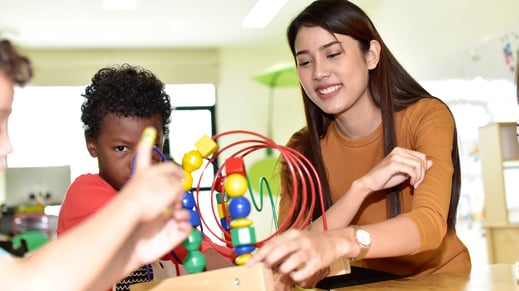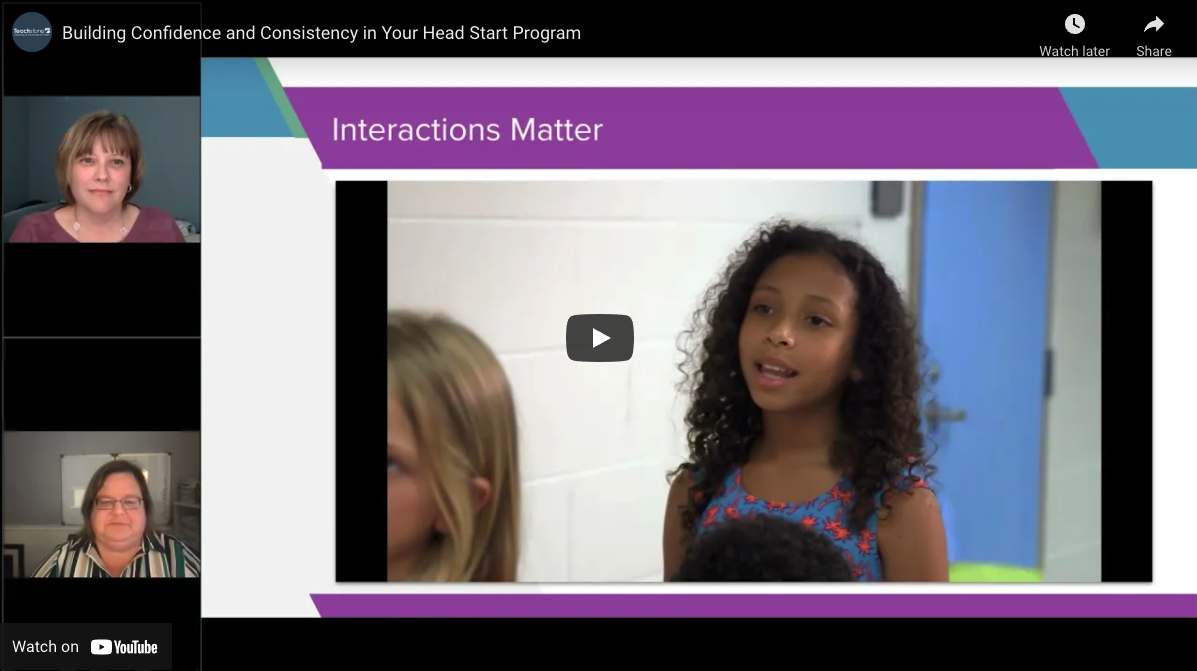
On November 9, 2021, Teachstone hosted the Building Confidence and Consistency in Your Head Start Program webinar with Sara Diamond, Director of Partnership Development at Teachstone, and Michelle Crawford, CLASS® Specialist.
Together, Sara and Michelle provided tips for helping educators dig deeper in their interactions and feel more confident in their teaching practice. Before diving into the tips for building confidence and consistency, Michelle shared a powerful quote from Lori Archer, a Head Start teacher:
I am not only a graduate of Start, I am teacher, and I was lucky enough to have both of my children attend Head Start too. Head start has impacted my life tremendously. As a student it identified me as needing help with speech and set me up to be a successful learner. As a parent, it helped both my children become independent, confident, and kind people. Head Start accepted my special needs son when he was kicked out of preschool after less than 2 weeks. As a teacher, Head Start has given an amazing chance to help at risk children be successful and blossom. Also, I have built amazing relationships with the families I work with.
Thousands of students and families are impacted by the work that continues to happen within Head Start programs. This continual drive for early education and meaningful interactions continues to guide generations of students to sound mental health and academic success.
To demonstrate the power that interactions can have on child outcomes, Sara shared a video from Atlanta Speech School.
Webinar participants quickly pointed out that some of the interactions in the video included positive learning environments, recognition of the children, and building connections.
Even the smallest changes in our interactions can have a great impact in a child’s life.
For example, a smile, an encouraging word, or a gentle reminder can make students feel safe and welcome. Meaningful interactions are HOW we improve student outcomes. They are WHAT we are doing already that can be improved and done more consistently. And, they are WHY we come to work every day.
And yet, it’s hard to be consistent with our interactions as educators. Other factors often compete for teachers’ attention like new cleaning protocols, challenging behaviors, and difficult relationships with coworkers. These priorities can make it hard to focus on what matters most — interacting with students.
Michelle shared tips for maintaining consistent, high-quality interactions, reminding us that, as educators, we set the tone in our classrooms. Perfection isn’t the name of the game when it comes to teaching. However, there are things you can do to stay focused on your interactions.
3 Steps for Building Consistency
1. Celebrate small moments by noticing and recognizing the little wins you have with children in your class each day.
2. Be willing to take a risk. Remember that there’s no such thing as a perfect teacher. Making small changes to your teaching practices can feel like a risk, but child outcomes are absolutely worth it.
3. Remain open to feedback so that your practice is continuously improving.
5 Steps for Building Confidence
1. Use the Know, See, You approach. Know what makes a “good” interaction. Pause to look and see the interactions between you and your students. Notice what are you doing to contribute to the behaviors.
2. Apply what works after pausing to observe which practices are making a difference in your classroom.
3. Be in the moment with your students, understanding their behaviors, their challenges and needs.
4. Proactively plan for success. Once we understand our children and their needs, we have to apply the right interactions and understand what changes can be proactively made to have a successful classroom.
5. Establish routines to help students know what to expect and have that consistency that will build confidence and in return create an environment that thrives. Routines are not boring. They are a helpful tool that will enable you to dig deeper in your lessons.
You can build that confidence; you can build that consistency
- Michelle Crawford.
We as educators, leaders, and coaches should have a support system to remind us of our worth and importance. We need the encouragement, the consistency to keep the confidence in our programs.
Small things will lead to big changes
- Michelle Crawford.
We need to be confident in making changes but being realistic and understanding that things will happen but change can be done even if it takes time. Giving ourselves grace, giving our students grace as well, keeping up the meaningful communications will be of such reward.
Focus on your why, remind yourself of what you are passionate about, why you are there. But always remember to put yourself on the list of your why’s, taking care of yourself will ensure you are able to take care of your students.
Want to get additional tips? Watch the full recording here.
What tips would you add to this list? How are you staying focused? Share your tips in the CLASS Learning Community!
About the Presenters
Michelle Crawford, CLASS specialist at Teachstone, has worked in early care and education for 25 years. Michelle has a bachelors degree in psychology and family child development as well as a masters degree in education with an emphasis in special education from Texas State University. She was introduced to CLASS in 2011 and realized she found the tool that spoke the language to support quality early childhood practices.
Sara Diamond, Director of Partnership Development at Teachstone, has a bachelors degree in human development and family studies from Pennsylvania State University. Sara has gained valuable experience in over 20 years in early childhood settings including teaching and observing. In her role at Teachstone Sara provides thought leadership and guidance around large scale quality improvements focused on ensuring every child and educator are equipped for lifelong success.


